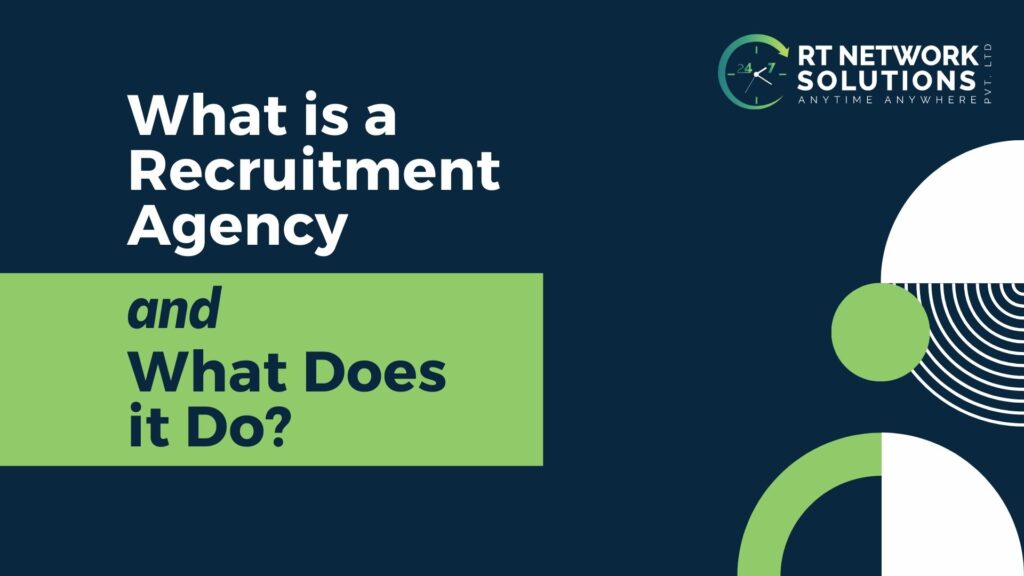10 Key Benefits of Using a Recruitment Agency for Your Hiring Needs

Hiring the right talent is one of the most crucial steps in building a successful business. While some companies may opt to handle recruitment internally, many choose to partner with a recruitment agency to meet their recruitment needs. In this blog, we’ll explore the various benefits of using a recruitment agency for hiring and how it can make the recruitment process more efficient and effective. Why hire a recruitment agency? 1. Access to a Larger Pool of Talent Recruitment agencies have access to a larger pool of talent. Hence, they leverage a vast network of candidates, many of whom may not be actively searching for a job but are open to new opportunities. This means that recruitment agencies can reach a wider range of qualified candidates, both active and passive job seekers. By partnering with an agency, businesses gain access to this diverse talent, which they might not find through traditional job postings. 2. Saves Time and Resources Hiring potential candidates is often a time-consuming process that demands a lot of attention to detail. From writing job descriptions and posting ads to screening resumes, conducting interviews, and negotiating offers, the hiring process can drain both time and resources. A recruitment agency can take over most of these tasks, allowing you to focus on other aspects of your business. Agencies handle various stages of the hiring process, such as: Shortlisting candidates Conducting background checks Scheduling interviews Filtering out unqualified applicants 3. Expertise and Industry Knowledge Recruitment agencies specialize in finding the right candidates for specific industries or roles. This gives them a deep understanding of market trends, salary expectations, and the skills required for various positions. With this expertise, agencies can help companies make informed decisions when hiring. Whether you’re looking for someone in IT, marketing, finance, or any other sector, recruitment agencies can provide guidance on: What skills are in demand The average salary for specific roles The latest hiring trends Their expertise can ensure that you attract the right talent at the right time. 4. Faster Hiring Process The recruitment process can sometimes take weeks or even months to complete, especially if you are conducting multiple rounds of interviews. By working with a recruitment agency, you can speed up the hiring process significantly. Agencies are experienced at managing timelines, scheduling interviews, and handling communication between all parties. Since agencies have pre-screened candidates ready to go, the process of finding a qualified candidate can be much faster. This is particularly valuable when you need to fill a position quickly due to business growth or staff turnover. 5. Reduced Risk of Bad Hires Making a bad hire can be costly. Hiring the wrong candidate can cause: Decreased productivity Team morale issues Additional hiring costs Wasted training time Recruitment agencies help avoid such risks by thoroughly examining candidate profiles and interviewing them before presenting them to the employer. They check qualifications, skills, experience, and cultural fit, reducing the chances of hiring someone who isn’t suitable for the role. This thoroughness helps you make better, more informed decisions. 6. Cost-Effective in the Long Run There is a cost associated with hiring a recruitment agency. However, the investment can be much more cost-effective in the long haul since a poor hire can result in high costs related to training, severance, and the time spent searching for a replacement. Recruitment agencies help minimize these costs by improving the quality of hires and reducing turnover rates. In addition, many agencies offer flexible payment models, such as: Retained search: In this model, you pay a fee upfront to engage the agency for an exclusive search. Contingency search: Out here, you only pay once the agency successfully fills the role. These options provide businesses with a cost-effective way to recruit without upfront financial strain. 7. Improved Candidate Experience Recruitment agencies also focus on providing a positive experience for candidates. A smooth, respectful hiring process can help your company build a strong reputation, which is important for attracting top talent. Recruitment agencies can ensure candidates are kept in the loop at every stage of the process, from initial interviews to job offers. By streamlining communication, giving feedback, and keeping candidates engaged, agencies enhance the overall experience, making your company more appealing to potential employees. 8. Confidentiality and Discretion In some situations, businesses may need to fill a position without revealing too much information to the public. This could be due to internal restructuring or high-level executive hiring. Recruitment agencies can conduct discreet searches, maintaining confidentiality throughout the process. Agencies can also act as intermediaries, ensuring that sensitive negotiations or changes remain private until the right candidate is hired. 9. Flexibility in Recruitment Needs Recruitment agencies can help with a variety of staffing needs. Whether you need temporary workers for short-term projects, permanent hires for long-term roles, or seasonal staff for peak times, agencies can help you meet your specific needs. Agencies offer immense flexibility to businesses allowing them to scale up or scale down quickly based on their current manpower needs. They can assist with hiring across various levels, from entry-level employees to senior executives. 10. Specialised Roles and Niche Hiring Some roles require highly specialized skills that can be difficult to find through traditional hiring methods. Whether you need an IT expert, a specific language translator, or a specialized technician, recruitment agencies can help you find candidates with niche skills. They have the networks and expertise to locate talent that may not be accessible through general hiring channels. In today’s competitive job market, hiring the right talent is crucial to a company’s success. While it might seem tempting to handle the recruitment process internally, partnering with a recruitment agency can offer significant advantages. From accessing a larger talent pool and speeding up the hiring process to reducing the risk of bad hires and providing market insights, agencies offer a wide range of benefits that make the hiring process pleasant for the employer and the candidate. By leveraging the expertise and resources of a recruitment agency, businesses can
What Is An Executive Search? A Complete Guide

An executive search is a strategic recruitment process that is meant to secure the best leadership talent for senior and C-level placements. Executive search firms use robust search strategies to outmanoeuvre competitors in a highly competitive market, enhance their recruitment practices, and connect with the most eligible candidates. The selected candidate needs to possess exceptional soft skills and leadership capabilities to bring about change and growth for an organisation. What is the role of executive search firms? Executive talent search also known as headhunting is a personalised recruitment service that specialises in attracting highly skilled talent in key roles such as CEOs, CFOs, or Vice Presidents within an organisation. Such search firms leverage special headhunting strategies to carefully select a candidate pool. The firms work closely with an organisation’s leadership to define the core competencies needed for top executive positions. It ensures that potential candidates align with the specific needs and culture of an organisation. Executive search firms also help mitigate potential risks associated with hiring since a wrong hiring decision at a senior level could result in immense financial and reputational damage for an organisation. What are the types of executive search firms? Executive searches are done using a combination of advertisements, professional networks, and direct outreach. However, they comprise two different types, namely retained and contingency. The distinction lies in how the two types of firms charge for the services they offer. Retained Search Firms: Contingency Firms: What are the Key Distinctions of an Executive Search? A headhunting process differs from conventional recruitment processes due to the following: The Executive Search Process Step 1 – Initial Consultation and Strategy An executive searcher needs to thoroughly understand the needs, culture, and objectives of the hiring organisations to develop detailed position specifications. This includes technical requirements and leadership capabilities. This is the initial stage of filtration that serves as the foundation for the entire search process. Step 2 – Market Mapping and Research After setting up the parameters, head hunters conduct extensive market analysis to source potential candidates. This involves mapping out competitor organisations, understanding industry trends, and creating a detailed list of potential candidates. The process often goes above and beyond the obvious choices to uncover hidden talent pools. Step 3 – Candidate Approach and Assessment Experienced consultants make discreet approaches to potential candidates, often engaging them in sophisticated discussions about their career aspirations and potential opportunities. The best executive searchers are master relationship builders who can engage even the most satisfied executives in career discussions. Step 4 – Evaluation and Due Diligence Candidate assessment is not only about reviewing resumes and taking interviews. An evaluation includes many other factors such as: Presentation and Selection Eligible candidates are presented to the client with detailed reports that cover their experience, competencies, and potential fit with the organisation. The search firm conducts interviews, provides feedback, and helps manage the entire selection process. How to Choose the Right Search Partner? Measure Success The success of an executive search goes beyond just filling the position. Key metrics to consider include: The Future of Executive Search Executive search continues to evolve at a rapid pace every year. This is leading to many rising trends, some of which include: As modern businesses continue to evolve, executive search remains a mainstay. Hiring the right candidate for top-tier positions with exceptional leadership qualities becomes increasingly important as an organisation faces complex challenges. Executive search firms understand and conduct the sophisticated hiring process and help companies make informed decisions that benefit them in the long run. So, partner with a highly competitive executive search firm to secure top-tier talent that drives your brand success to newer heights with each passing day.
What is a Recruitment Agency and What Does it Do?

The modern job market is a complex ecosystem where finding the right job or the perfect candidate can be challenging. This is where recruitment agencies such as RTNS come into play, serving as valuable intermediaries in the employment process. But what exactly are these agencies, and how do they function in the world of hiring? Let’s explore the role and significance of recruitment agencies in today’s workforce landscape. Defining a Recruitment Agency A recruitment agency serves as a professional intermediary in the job market, connecting employers with potential employees. These organizations specialize in identifying, evaluating, and presenting suitable candidates to companies looking to fill specific roles. Often referred to as employment agencies or staffing firms, they act as a bridge between the talent pool and businesses, streamlining the hiring process for both parties involved. What Does Recruitment Agencies Do Recruitment agencies perform several key functions: Benefits for Employers Benefits for Job Seekers Types of Recruitment Agencies Conclusion Recruitment agencies play a vital role in today’s job market, offering valuable services to both employers and job seekers. By understanding how these agencies operate, both parties can leverage their expertise to achieve their hiring and career goals more effectively.


